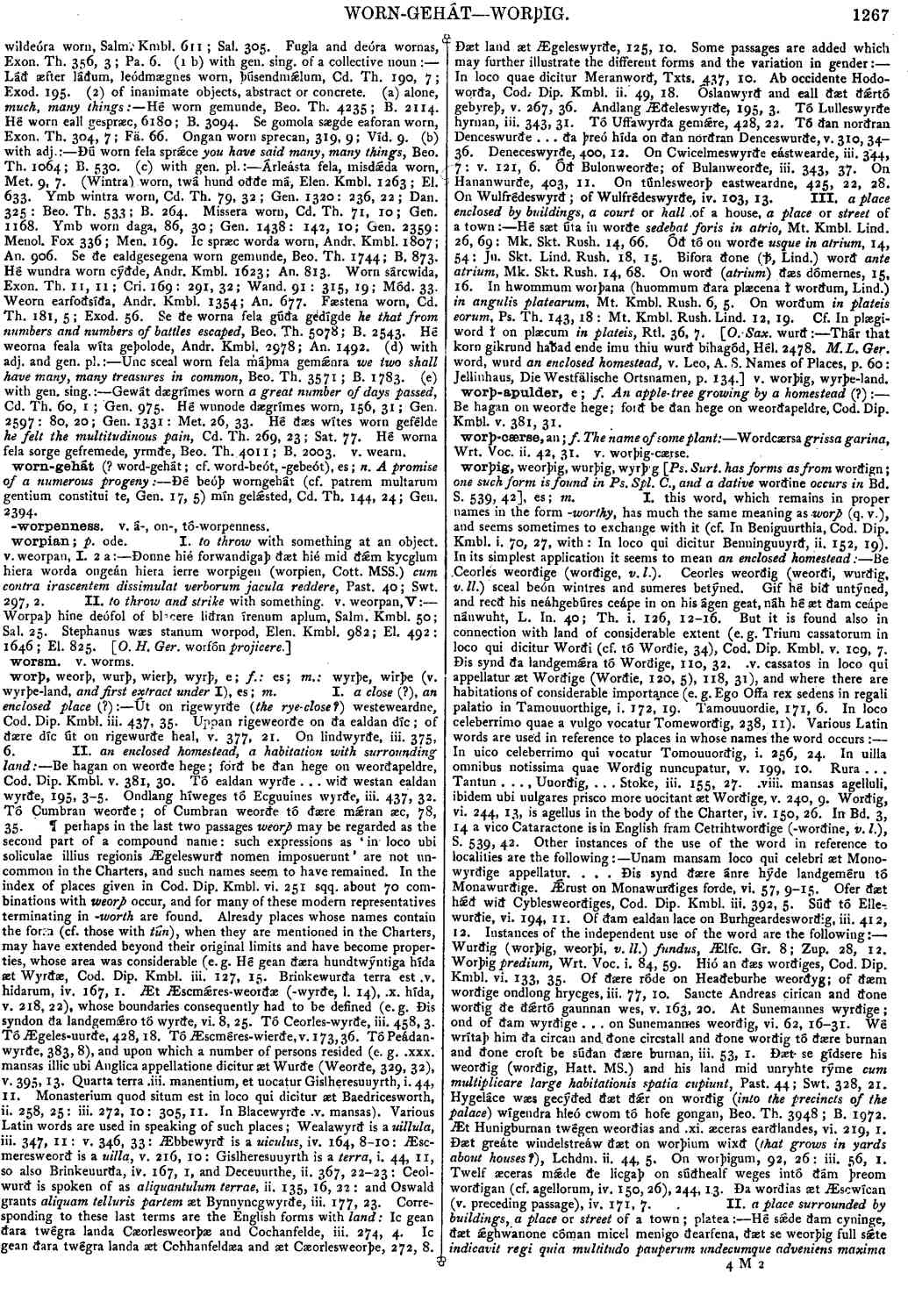worþ
- noun [ masculinefeminine ]
-
Út on rigewyrðe (the rye-close ?) westeweardne,
- Cod. Dip. Kmbl. iii. 437, 35.
-
Uppan rigeweorðe on ða ealdan díc; of ðære die út on rigewurðe heal,
- v. 377, 21.
-
On lindwyrðe,
- iii. 375, 6.
-
Be hagan on weorðe hege; forð be ðan hege on weorðapeldre,
- Cod. Dip. Kmbl. v. 381, 30.
-
Tó ealdan wyrðe . . . wið westan ealdan wyrðe,
- 195, 3-5.
-
Ondlang híweges tó Ecguuines wyrðe,
- iii. 437, 32.
-
Tó Cumbran weorðe; of Cumbran weorðe tó ðære mǽran æc,
- 78, 35.
-
¶ perhaps in the last two passages weorþ may be regarded as the second part of a compound name: such expressions as 'in loco ubi soliculae illius regionis Ægeleswurð nomen imposuerunt' are not uncommon in the Charters,
and such names seem to have remained. In the index of places given in Cod. Dip. Kmbl. vi. 251 sqq. about 70 combinations with weorþ occur,
and for many of these modem representatives terminating in -worth are found. Already places whose names contain the form (cf. those with
tún), when they are mentioned in the Charters,
may have extended beyond their original limits and have become properties,
whose arca was considerable
(e. g. Hé gean ðæra hundtwýntiga hída æt Wyrðæ,
- ii. 258, 25 :
- iii. 272, 10 :
- 305, ii.
- Cod. Dip. Kmbl. in. 127, 15.
- iv. 167, 1.
- 1. 14
- x.
- v. 218, 22
- vi. 8, 25.
- iii. 458, 3.
- 428, 18.
- v. 173, 36.
- 383, 8
- 329, 32
- v. 395, 13.
- i. 44, 110.
-
Wealawyrð is a uillula,
- iii. 347, ii: v. 346, 33:
- iv. 164, 8-10:
- v. 216, 10 :
- i. 44, 11.
- iv. 167, 1,
- ii. 367, 22-23 :
- ii. 135, 16, 22 :
- iii. 177, 23.
-
Ic gean ðara twégra landa Cæorlesweorþæ and Cochanfelde,
- iii. 274, 4.
-
Ic gean ðara twégra landa æt Cohhanfeldæa and æt Cæorlesweorþe,
- 272,
-
Ðæt land æt Ægeleswyrðe,
- 125, 10.
-
In loco quae dicitur Meranworð,
- Txts. 437, 10.
-
Ab occidente Hodoworða,
- Cod. Dip. Kmbl. ii. 49, 18.
-
Óslanwyrð and eall ðæt ðǽrtð gebyreþ,
- v. 267, 36.
-
Andlang Æðeleswyrðe,
- 195, 3.
-
Tó Lulleswyrðe hyrnan,
- iii. 343, 31.
-
Tó Uffawyrða gemǽre,
- 428, 22.
-
Tó ðan norðran Denceswurðe . . . ða þreó hída on ðan norðran Denceswnrðe,
- v. 310, 34-36.
-
Deneceswyrðe,
- 400, 12.
On Cwicelmeswyrðe eástwearde,
- iii. 344, 7 :
- v. 121, 6.
-
Óð Bulonweorðe; of Bulanweorðe,
- iii. 343, 37.
-
On Hananwarðe,
- 403, 11.
-
On túnlesweorþ eastweardne,
- 425, 22, 28.
-
On Wulfrgdeswyrð; of Wulfrédeswyrðe,
- iv. 103, 13.
-
Hé sæt úta in worðe
sedebat foris in atrio,
- Mt. Kmbl. Lind. 26, 69 :
- Mk. Skt. Rush. 14, 66,
-
Óð tó on worðe
usque in atrium,
- 14, 54 :
- Jn. Skt. Lind. Rush. 18, 15.
-
Bifora ðone (ꝥ,
- Lind.
ante atrium,
- Mk. Skt. Rush. 14, 68.
-
On word (atrium) ðæs dómernes,
- 15, 16.
-
In hwommum worþana (huommum ðara plæcena ł worðum,
- Lind.
in angulis platearum.
- Mt. Kmbl. Rush. 6, 5.
-
On worðum
in plateis eorum.
- Ps. Th. 143, 18 :
- Mt. Kmbl. Rush. Lind. 12, 19.
-
Cf. In plægiword ł on plæcum
in plateis,
- Rtl. 36, 7,
- Hél. 2478.
- v. Leo, A. S. Names of Places, p. 60 :
- Jellinhaus, Die Westfälische Ortsnamen, p. 134.
Bosworth, Joseph. “worþ.” In An Anglo-Saxon Dictionary Online, edited by Thomas Northcote Toller, Christ Sean, and Ondřej Tichy. Prague: Faculty of Arts, Charles University, 2014. https://bosworthtoller.com/36513.
Checked: 1